

The Only Realistic Way to Fix Campaign Finance. Photo CAMBRIDGE, Mass. — FOR the first time in modern history, the leading issue concerning voters in the upcoming presidential election, according to a recent Wall Street Journal/NBC News poll, is that “wealthy individuals and corporations will have too much influence over who wins.”
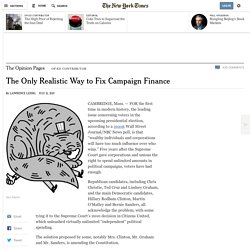
Five years after the Supreme Court gave corporations and unions the right to spend unlimited amounts in political campaigns, voters have had enough. Republican candidates, including Chris Christie, Ted Cruz and Lindsey Graham, and the main Democratic candidates, Hillary Rodham Clinton, Martin O’Malley and Bernie Sanders, all acknowledge the problem, with some tying it to the Supreme Court’s 2010 decision in Citizens United, which unleashed virtually unlimited “independent” political spending.
Differences. The Economist explains: Why does the debt ceiling matter? A Dark Money Group by Any Other Name. Organizing for Action (nee Obama for America), the campaign committee that morphed into an outside money haven, is trying change its image from a that of dark money group selling access to the president to a squeaky clean issues-centric organization.
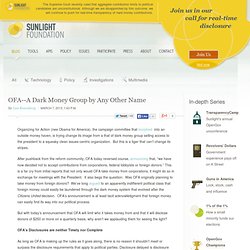
But this is a tiger that can’t change its stripes. After pushback from the reform community, OFA today reversed course, announcing that, “we have now decided not to accept contributions from corporations, federal lobbyists or foreign donors.” Murkier Than Oil. Greg Palast is a New York Times bestselling author and fearless investigative journalist whose reports appear on BBC Television Newsnight and in The Guardian.

Palast eats the rich and spits them out. Catch his reports and films at www.GregPalast.com, where you can also securely send him your documents marked, "confidential". Last week, I wrote about the giant XL Keystone Pipeline that the Koch brothers want to build to transport Canada's cheap crude oil down to their Texas refinery. A Campaign Map, Morphed By Money : It's All Politics. Explore political ad spending through creative cartography.
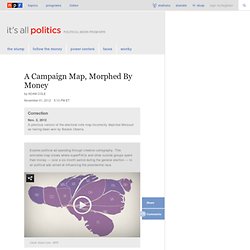
This animated map shows where superPACs and other outside groups spent their money — over a six-month period during the general election — to air political ads aimed at influencing the presidential race. Campaign reporters spend a lot of time pointing at color-coded electoral maps like the one below, showing which states voted for Republican John McCain (in red) and Democrat Barack Obama (in blue) in 2008. Adam Cole/NPR But these maps lie — visually speaking. Red appears to be the clear winner, dominating a vast swath from the South to the Rockies. How Not to Choose a President. Bad ideas in Obama/Romney town hall debate. What Bill Clinton Said - Read it Here (You'll Never Lose Another Political Argument) Transcript of former President Bill Clinton’s speech at the Democratic National Convention, as prepared for delivery:
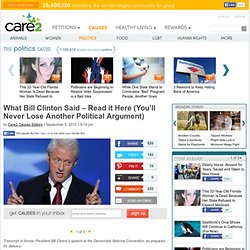
Democratic Detailed Delegate Allocation - 2012. Primary Calendar Delegate selection primaries, caucuses, and conventions will begin on the first Tuesday in March (6 March 2012) and end on the second Tuesday in June (12 June 2012).
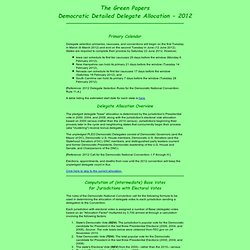
States are required to complete their process by Saturday 23 June 2012. However, Iowa can schedule its first tier caucuses 29 days before the window (Monday 6 February 2012), New Hampshire can hold its primary 21 days before the window (Tuesday 14 February 2012), Nevada can schedule its first tier caucuses 17 days before the window (Saturday 18 February 2012), and South Carolina can hold its primary 7 days before the window (Tuesday 28 February 2012). [Reference: 2012 Delegate Selection Rules for the Democratic National Convention: Rule 11.A.] Column: Why is there no liberal Ayn Rand? Ask Republican vice presidential nominee Paul Ryan how he became a conservative and he'll probably answer by citing a book.
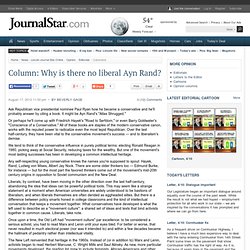
Paul Ryan’s Fairy-Tale Budget Plan. The Very Angry Tea Party. Voter Turnout Appears Light in Louisiana Primary. GOP’s Gary Johnson and Buddy Roemer Shut Out of 2012 Debates. Is Obama Toast? Handicapping the 2012 Election. Coming Up Empty - By Stephen Walt. My FP colleague (and Zombie maven) Dan Drezner had an excellent post up a couple of days ago, defending Obama's foreign policy against various GOP challenges (most of them, as he points out, silly).

The payoff pitch is Dan's fantasy of what an Obama stump speech on this topic might say: As president, I have to address both domestic policy and foreign policy. Because of the way that the commander-in-chief role has evolved, I have far fewer political constraints on foreign policy action than domestic policy action. So let's think about this for a second.
On the foreign stage, America's standing has returned from its post-Iraq low. As Andrew Sullivan points out, that last line is a killer. 1. OLIVIER MORIN/AFP/Getty Images 2. Mark Wilson/Getty Images 3. -/AFP/Getty Images 4. John Moore/Getty Images 5. 6. Chris Hondros/Getty Images 7. MICHAEL GOTTSCHALK/AFP/Getty Images 8. JUNG YEON-JE/AFP/Getty Images 9. Spencer Platt/Getty Images. Five questions with Mitt Romney - Multimedia. Optional flat tax will launch recovery. By Newt Gingrich The coming economic boom will begin the minute the television networks announce the defeat of President Obama’s reelection bid on Election Day 2012.
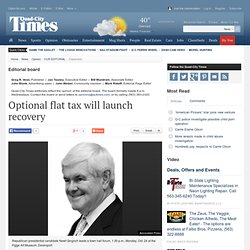
Every single American worker, entrepreneur, and small business owner will finally know that their taxes will not be increased, their regulatory burdens will not be increased, and that government will no longer pick winners and losers in what is the already challenging task of competing in a global economy. The resulting explosion of economic and entrepreneurial activity will be enormous as confidence soars that the federal government will no longer be an active opponent of their success. Herman Cain's Chilean Model, Explained. For the second consecutive Republican president debate, pizza mogul and talk radio host Herman Cain has suggested the "Chilean Model" as a way to fix Social Security.
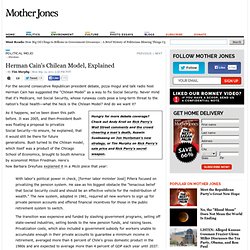
Never mind that it's Medicare, not Social Security, whose runaway costs pose a long-term threat to the nation's fiscal health—what the heck is the Chilean Model? And do we want it? As it happens, we've been down this path before. It was 2005, and then-President Bush was floating a proposal to privatize Social Security—to ensure, he explained, that it would still be there for future generations. Bush turned to the Chilean model, which itself was a product of the Chicago School of Economics, brought to South America by economist Milton Friedman.